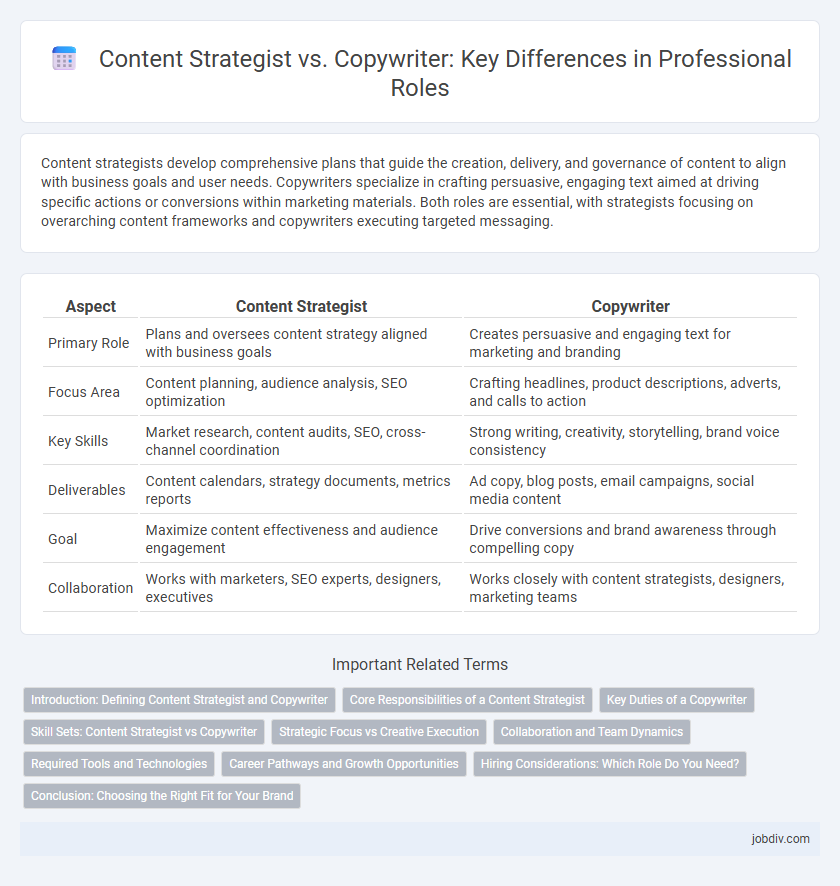Content strategists develop comprehensive plans that guide the creation, delivery, and governance of content to align with business goals and user needs. Copywriters specialize in crafting persuasive, engaging text aimed at driving specific actions or conversions within marketing materials. Both roles are essential, with strategists focusing on overarching content frameworks and copywriters executing targeted messaging.
Table of Comparison
| Aspect | Content Strategist | Copywriter |
|---|---|---|
| Primary Role | Plans and oversees content strategy aligned with business goals | Creates persuasive and engaging text for marketing and branding |
| Focus Area | Content planning, audience analysis, SEO optimization | Crafting headlines, product descriptions, adverts, and calls to action |
| Key Skills | Market research, content audits, SEO, cross-channel coordination | Strong writing, creativity, storytelling, brand voice consistency |
| Deliverables | Content calendars, strategy documents, metrics reports | Ad copy, blog posts, email campaigns, social media content |
| Goal | Maximize content effectiveness and audience engagement | Drive conversions and brand awareness through compelling copy |
| Collaboration | Works with marketers, SEO experts, designers, executives | Works closely with content strategists, designers, marketing teams |
Introduction: Defining Content Strategist and Copywriter
A Content Strategist develops comprehensive plans that align content creation with business goals, focusing on user engagement, SEO, and brand consistency across multiple platforms. A Copywriter specializes in crafting persuasive and compelling text designed to motivate the audience to take specific actions, such as purchasing or subscribing. Both roles require a deep understanding of audience behavior, but content strategists prioritize long-term planning while copywriters emphasize immediate impact through precise language.
Core Responsibilities of a Content Strategist
A Content Strategist develops comprehensive plans to align content with business goals, ensuring consistent messaging across all channels. They analyze audience data and industry trends to create targeted content frameworks that drive engagement and conversion rates. Unlike copywriters who focus primarily on text creation, content strategists oversee the content lifecycle, including planning, distribution, and performance measurement.
Key Duties of a Copywriter
A copywriter crafts persuasive and compelling content tailored to target audiences, focusing on sales-driven messaging for advertisements, websites, and promotional materials. They excel in SEO optimization to boost search engine rankings and audience engagement. Precision in language and creativity are pivotal to transforming brand messages into clear, impactful copy that drives conversions and supports marketing goals.
Skill Sets: Content Strategist vs Copywriter
Content Strategists excel in skills such as audience analysis, SEO expertise, content planning, and performance analytics, enabling them to develop comprehensive content strategies aligned with business goals. Copywriters specialize in persuasive writing, brand voice consistency, storytelling, and crafting compelling calls-to-action that drive engagement and conversions. While Content Strategists focus on the macro-level content framework and metrics, Copywriters concentrate on micro-level messaging and creative text execution.
Strategic Focus vs Creative Execution
A Content Strategist drives the overall vision by analyzing audience insights, setting content goals, and planning multi-channel campaigns to achieve business objectives. A Copywriter transforms that strategy into engaging, persuasive text tailored to specific formats, ensuring tone and messaging resonate with the target audience. The distinction lies in strategic focus on long-term impact versus creative execution of compelling copy.
Collaboration and Team Dynamics
Content strategists and copywriters collaborate closely to align messaging with overarching brand goals, ensuring cohesive communication across channels. Content strategists develop data-driven frameworks and editorial calendars that guide copywriters in creating impactful, target-audience-focused content. Mutual feedback loops between both roles enhance adaptability and optimize content performance within dynamic marketing teams.
Required Tools and Technologies
Content strategists rely heavily on analytics platforms like Google Analytics, content management systems (CMS) such as WordPress, and SEO tools including SEMrush or Ahrefs to plan, optimize, and monitor content performance. Copywriters primarily use writing and editing software like Microsoft Word or Google Docs, alongside grammar and style tools like Grammarly or Hemingway Editor to ensure clarity and engagement in their copy. Collaboration platforms such as Trello or Asana support both roles in project management and communication within content teams.
Career Pathways and Growth Opportunities
Content strategists develop overarching plans that guide content creation to align with business goals, often advancing into roles like content marketing manager or digital strategist with broader leadership responsibilities. Copywriters focus on crafting persuasive and engaging text, honing specialized skills that can lead to senior copywriting positions or creative director roles within advertising and marketing agencies. Both career paths offer growth potential, with strategists expanding into analytics and project management, while copywriters deepen their expertise in brand voice and campaign execution.
Hiring Considerations: Which Role Do You Need?
When deciding between a content strategist and a copywriter, consider your project's scope and goals: content strategists excel in planning, audience analysis, and multi-channel content frameworks, while copywriters specialize in creating persuasive, brand-aligned copy. Hiring a content strategist benefits companies aiming for long-term content growth and coherence, ensuring each piece supports overall business objectives. In contrast, hiring a copywriter is ideal for campaigns requiring compelling, targeted messaging that drives immediate engagement and conversions.
Conclusion: Choosing the Right Fit for Your Brand
Selecting the right fit between a Content Strategist and a Copywriter depends on your brand's specific needs: a Content Strategist excels in planning and aligning content with business goals, while a Copywriter specializes in crafting persuasive and engaging text that drives conversions. Brands seeking long-term content growth and consistent messaging benefit from the strategic oversight of a Content Strategist, whereas projects demanding targeted, high-impact communication require the expertise of a skilled Copywriter. Assessing your objectives and resource allocation ensures a tailored approach that maximizes content effectiveness and brand resonance.
Content Strategist vs Copywriter Infographic

 jobdiv.com
jobdiv.com